One of the more interesting questions I get is if it’s a good idea to ask your ex for help.
My thoughts on this have evolved over the years but ultimately I have found that asking your ex for help after a breakup is one of the most effective ways to get a response from your ex.
Notice how I say “response” and not “way to get your ex back.”
I think it’s important to consider the following factors.
- When you should ask your ex for help
- How to ask them for help
And today that’s what I’d really like to talk about. In today’s discussion I’m going to take you through:
- Why I think it’s a bad idea to ask your ex for help before you do a no contact rule
- Introduce you to the damsel in distress text
- Show you 4 real examples of people asking their ex for help
- Dissect what worked and how it can be improved
Let’s begin!

What Are Your Chances of Getting Your Ex Boyfriend Back?
Take the quizWhy I Think It’s A Bad Idea To Ask Your Ex For Help Before No Contact
So, the truth is that you really shouldn’t be asking your ex for help until after a no-contact rule is complete.
But the real question is, why?
You know, there are many different reasons why I think you shouldn’t ask your ex for help until after the no-contact rule is complete, but I believe it ultimately boils down to various attachment styles.
Now, most of our clients have what is considered an anxious attachment style.
This means their core wound centers around a fear of loss. They are terrified of being abandoned, and when they actually get triggered or become abandoned, they react in all sorts of wild ways.
They become desperate.
They beg for their ex’s back.
Perhaps the most interesting aspect of someone who has an anxious attachment style is the fact that, in a relationship, they’re always seeking reassurance because they’re always sleeping with one eye open, constantly viewing their partner as if this person is going to leave them, and they try to safeguard against this.
Often they end up caught in this cycle:
Now, this in essence is sometimes normal, but it becomes a major problem when you consider the fact that most of our clients’ exes, whom we actually study, possess the avoidant attachment style.
This style essentially revolves around a keen sense of independence. I discuss this at length in multiple YouTube videos and articles here on the website.
Someone with an avoidant attachment style is continually looking to retain their independence. So, there are these distinct trigger points that ultimately provoke them and make them want to leave.

What Are Your Chances of Getting Your Ex Boyfriend Back?
Take the quizOne of the trigger points is when they feel they’re being overcrowded.
You can actually observe this in my illustrative graphic called ‘The Avoidant Death Wheel’, where I essentially illustrate the experience of someone with an avoidant attachment style from the beginning to the end of a relationship.
There are eight main stages to it, but it’s really stage three that I want us to focus on.
First, let’s walk through the eight stages.
- Stage one: ‘I want someone to love me’.
- Stage two: ‘Hey, I found someone, my troubles are over’.
- Stage three: ‘I’m noticing some worrying signs’.
- Stage four: ‘I’m considering leaving’.
- Stage five: ‘I’ve resolved to exit this relationship’.
- Stage six: ‘Hey, I’m really glad that I left’.
- Stage seven: ‘I’m beginning to feel a bit lonely’.
- And stage eight: ‘Why can’t I ever find the right person?’
Now, stage three is particularly notable in the avoidant death wheel because this is where the avoidant person starts to identify anxious behavior in their partner, or they begin to hyper-analyze regular behaviors of their partner, perceiving them as anxious.
But if you possess an anxious attachment style and you are incessantly seeking reassurance, essentially you are steadily pushing your partner away. Because if your partner is avoidant, they will perceive their independence as being threatened, often prompting them to contemplate ending the relationship.
Therefore, one of the reasons why I strongly advocate not contacting your ex or seeking their assistance until after a no-contact period is finished, is to prevent triggering their avoidant tendencies.
If you bypass this and promptly seek your ex’s help post-breakup, you frequently activate their avoidant side, instilling a sort of PTSD from the grief, where they recollect moments in the relationship where you were perhaps too imposing, thereby propelling them to distance themselves even more.
This is a fundamental reason behind the creation of our value ladder.
In fact, if you refer to the value ladder graphic that I’m renowned for discussing, you’ll observe that I strictly advise my clients against interacting with their exes until after a period of no contact has been observed, and it’s essentially due to this rationale.
Observing the avoidant death wheel, you’ll notice a phase of ‘separation elation’ where they are ecstatic to have reclaimed their independence.
However, following this phase, a sense of loneliness sets in, they begin to pity themselves, which then spurs them to seek companionship anew. Our goal is to synchronize interactions with our ex at a point where they experience that loneliness and nostalgia, a feat achievable through the no-contact rule.
But is reaching out for help the ideal initial conversation with them?”
Introducing The Damsel In Distress Text
Well, I’d like to introduce you to a concept that my wife devised, termed the “Damsel in Distress” text.
A little background: several years ago, my wife and I were exploring various strategies that could assist our clients in initiating conversations with their exes.
Frequently, the guidance we offered involved sending a somewhat flawed “I have a confession to make” text.
This approach was indeed effective at eliciting responses from exes, but the downside was the negative connotation associated with it. Using such a phrase often led the recipient to assume the worst, perhaps suspecting infidelity or other negative developments, thereby entering the conversation with defenses raised.
However, what we did glean from this method was the success of aligning the ‘confession’ with an interest of the ex’s, essentially focusing on topics they are keen on.
Somewhat serendipitously, we stumbled upon the concept of the “Damsel in Distress” text. This technique seems to work equally well for men, although we initially conceived it with women in mind. If you’re a male reading this, rest assured, it can be effective for you too.
The essence of the “Damsel in Distress” text is to succinctly seek help from your ex, positioning yourself somewhat as a person in need whom they might feel compelled to assist.
While it may seem counterintuitive, I can assure you of its effectiveness.

What Are Your Chances of Getting Your Ex Boyfriend Back?
Take the quizLooking At Four Real Damsel In Distress Messages
To substantiate this claim, I delved into our vibrant community, a fantastic space home to over 1000 members and a wealth of insightful breakup resources.
One such resource is a repository of 50 to 60 first-contact text messages, post-no-contact period, that garnered positive responses. This provides a real-time glimpse into successful post-breakup conversations.
To illustrate, I have extracted four successful instances of the “Damsel in Distress” text exchanges.
Text #1:
The first one was centered around soliciting the ex’s expertise in reselling.
This message received a warm response within approximately five hours, facilitating a pleasant conversation. This approach worked not only because it cast our client as the ‘damsel in distress’ but also because it flattered the ex’s expertise in reselling.
Text #2:
Following the same vein, the second example focused on the ex’s cooking skills, and similarly drew a response in about four hours. Once again, this approach was successful, creating a dialogue that not only showcased the sender as someone seeking assistance but also boosted the ex’s ego regarding their culinary skills.
Moving on, we also have instances where the message simply involves seeking advice from the ex, like the next example I’m about to share.
Text #3:
This particular conversation started with our client saying, “Hey, I need your advice,” and they actually got a response within minutes.
What’s interesting about this one is, I actually don’t know why it works so well, other than the fact that it was a damsel in distress message, and the ex probably still had feelings for them or cared about them enough to drop what they were doing to help them out.
Text #4:
There’s another message that’s very similar to this one where our client said, “Hey, have you got a moment to help me out?” and this one received a response within 10 minutes.
Once again, there’s nothing really amazing about this other than the fact that it is just a classic damsel in distress text message. “Have you got a moment to help me out?” is literally asking for help, but just because these worked doesn’t mean I don’t think they could be improved.
In fact, I believe every single one of these text message examples that worked are flawed.
My Critique
I actually think the smart approach would be to simply apply my texting formula to them.

What Are Your Chances of Getting Your Ex Boyfriend Back?
Take the quizIf you’re not familiar, I’ve written extensively about the texting formula in the past.
In fact, within our community, I have compiled a comprehensive texting guide that everyone receives for free in the texting discussion tab, where I elucidate this formula and explain my theory on why it is effective.
Essentially, the formula is: Hook + Payoff + High Point = Success
Regarding the damsel in distress text message examples that I’ve shared above, they don’t always follow this formula.
- Basically, the hook in these instances was asking for help.
- The payoff is explaining what you need help with.
- And essentially, the high point is concluding the conversation at a positive peak.
If you adhere to this formula consistently throughout all your conversations with your ex, you create what is termed as momentum. You’re the one ending conversations first, steering them to remain ideally positive, which progressively makes your ex more eager to converse with you. That’s the underlying rationale here.
However, I would like to demonstrate how I would modify these texts if I were personally coaching these individuals.
How I Would Improve The Damsel In Distress Examples
When you examine the four damsel in distress text messages above, you can essentially divide them into two different categories.
Initially, we have four versions of the same text, and I’d like to categorize them into two groups.
- Category one will include the “I need your reselling expertise” and “I need your cooking expertise” messages.
- Category two will encompass the “I need your advice” and “have you got a moment to help me out” messages.
If you ponder it, these two categories basically encapsulate people posing the same kind of question.
Improving The Texts In Category #1:
Now, let’s scrutinize the “I need your reselling expertise” and “I need your cooking expertise” text messages first.
The problem I discern with these two messages is that I think they reveal the payoff too quickly.
There’s no intrigue surrounding what they need assistance with; it’s clearly about reselling or cooking.
Consequently, the conversation initiates with “Hey, I need your reselling expertise” or “Hey, I need your cooking expertise,” devoid of any mystery or allure that might prompt the ex to respond.
Yes, they did receive a response from their ex, which is positive, but it lacks the inherent curiosity that the other texts or categories might possess.
However, this isn’t even the most significant issue.
In reality, I believe the central issue here is the necessity to escalate the urgency. By this, I mean a successful hook contains an element of urgency, a compelling factor to incite a response.
One criticism I have is that for these two messages in this category – “I need your reselling expertise” and “I need your cooking expertise” – the exes took about four to five hours to respond.
In contrast, the other category received responses within minutes. This discrepancy, I think, stems from a missing element of mystery and a lack of urgency. A more effective text might be
“SOS, I have an urgent problem and I really only trust you for the answer.”
This format offers the best of both worlds: it introduces urgency with “SOS” and the mention of an urgent problem, and simultaneously boosts the ex’s ego with “I really only trust you for the answer,” all while maintaining a level of mystery about the actual problem, potentially prompting quicker responses.
Now, let’s turn our attention to the other category.
Improving The Texts In Category #2:
In this section, we encounter an overarching blandness in both text messages. “I need your advice” is somewhat straightforward and, albeit having a tinge of mystery, lacks urgency.
Similarly, “have you got a moment to help me out?” presents a problem in its passivity.
While the damsel in distress message inherently requests help, the manner in which the help is sought holds significance.
The phrase “have you got a moment to help me out?” allows an easy exit for the ex to decline.
What is paramount here is to remove the passive language and imbue the message with a sense of urgency.
My suggestion would be to revise it to “Something happened… I need your advice.”
This structure is more effective as it encompasses all the desired elements: mystery, urgency, and a nod to the ex’s ego, implying that their advice is valued. To emphasize this, you might further amend it to “Something happened… I need your advice, and I only really trust you for an answer.”
Ultimately, the objective of seeking help from your ex is to initiate a conversation, proceed to request assistance, and then steer the dialogue towards a more substantive and meaningful direction. The hope is that through this method, rapport is built incrementally, fostering a snowball effect of growing communication and connection. Therefore, while it is beneficial to ask your ex for help, it is crucial to strategically determine the appropriate time and manner to do so, enhancing the potential for a successful and meaningful conversation.
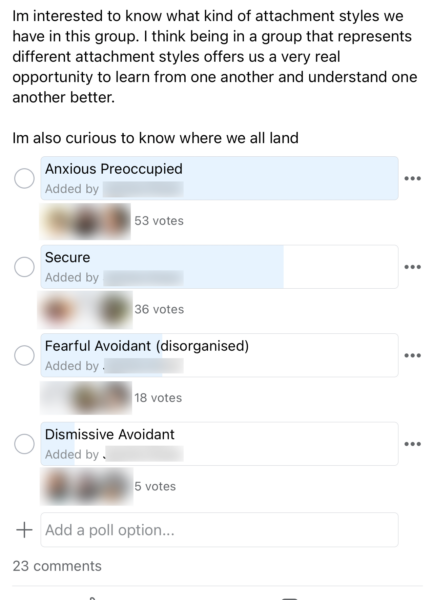
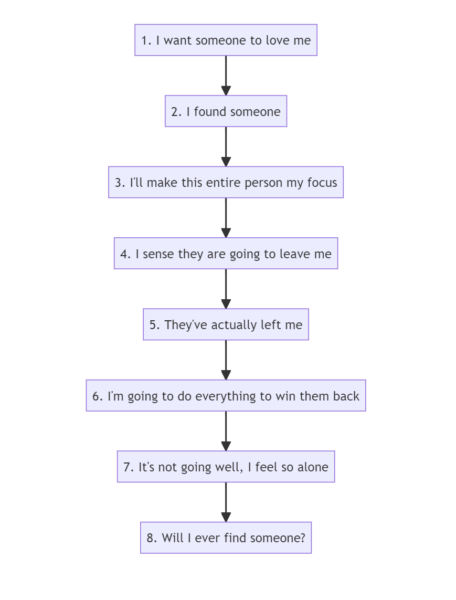
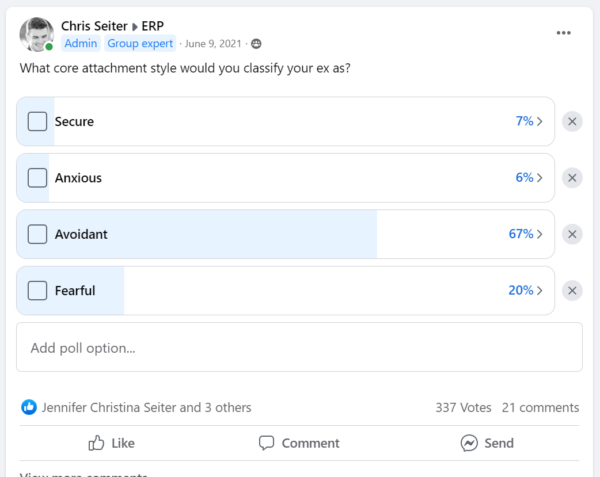
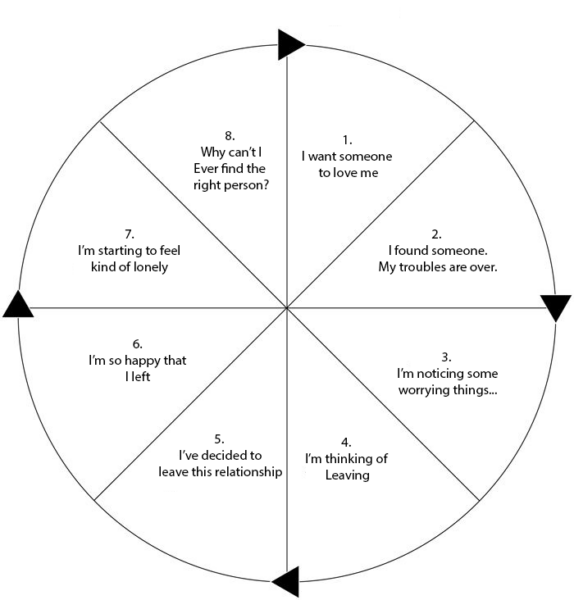




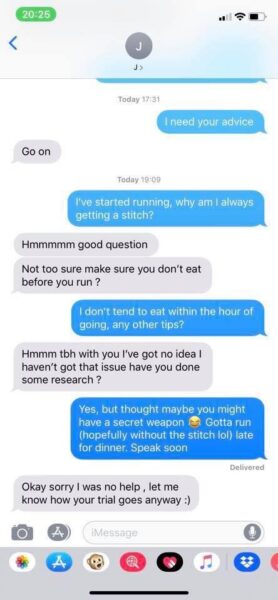
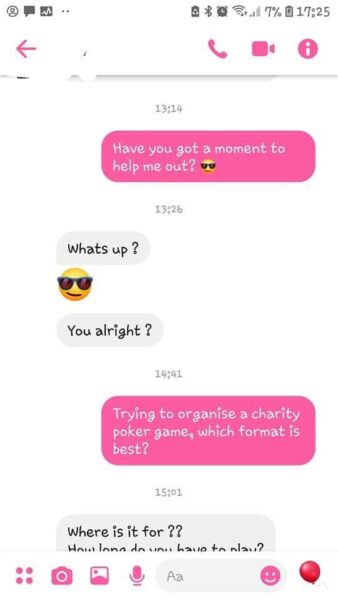
Kris
February 25, 2024 at 5:01 pm
Damsel in distress about a sudden crack in my living room ceiling got my architect DA ex to send me photographs from internet, detailed explanations and even a hand-made drawing of how to approach the crack problem. He took long (5-6 hours) to answer at first but, once we were texting, it was back and forth.